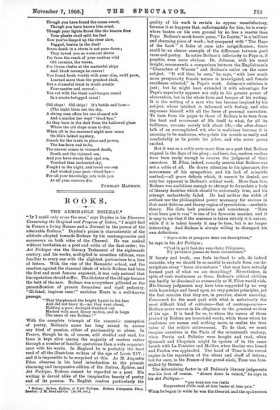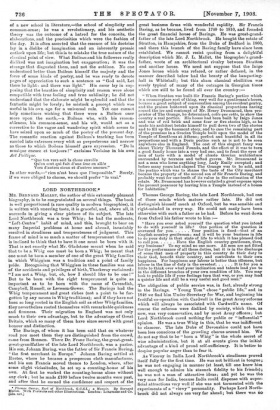BOOKS.
THE ADMIRABLE BOILEAl7.*
"IF I could only cross the seas," says Dryden in his Discourse
Concerning the Original and Progress of Satire, "I might find in France a living Horace and a Juvenal in the person of the admirable Boileau." Dryden's praise is characteristic of the attitude adopted towards Boileau by his contemporaries and successors on both sides of the Channel. He was ranked without hesitation as a poet and critic of the first order; his Art Fatigue was the literary Testament of the eighteenth century, and his works, multiplied in countless editions, were
familiar to every one with the slightest pretensions to a love of letters. With the rise of the Romantic school, and the reaction against the classical ideals of which Boileau had been the first and most famous exponent, it was only natural that his reputation should suffer. The dictator of the old age became the butt of the new. Boileau was everywhere pilloried as the personification of prosaic formalism and rigid pedantry.
"Ill-fated, impious race !" exclaims Keats in a well-known passage, "That blasphemed the bright Lyrist to his face And did not know it,—no, they went about, Holding a poor, decrepid standard out Marked with most flimsy mottos, and in large The name of one Boileau!"
With the complete triumph of the romantic conception of poetry, Boileau's name has long ceased to arouse any kind of passion, either of partisanship or abuse. In France, though he is, of course, still studied and read, his fame is kept alive among the majority of readers rather through a number of familiar quotations than a wide acquaint. ance with his works. In England he is probably the least read of all the illustrious writers of the age of Louis XIV.; and it is impossible to be surprised at this. As M. Augustin Filon observes in his brief introduction to the present charming and inexpensive edition of the Satires, Epitres, and Art Naive, Boileau cannot be regarded as a poet. His writing is devoid alike of the imaginative beauty of poetry and of its passion. To English readers particularly the • Boileau: Satires, Epitres, et L'Art Poetique. Preface d'Angtuttin Mon. London : J. M. Dent and Co. [la. 6d. net.] quality of his work is certain to appear unsatisfactory, because it so happens that, unfortunately for him, he is every-
where beaten on his own ground by no less a master than Pope. Boileau's mock-heroic poem, "Le Lntrin," is a brilliant and charming piece of work ; but compared with "The Rape of the Lock " it fades at once into insignificance ; there could be no clearer example of the difference between good verse and poetry. In satire Boileau's inferiority to Pope is, if possible, even more obvious. Dr. Johnson, with his usual insight, recommends a comparison between the Englishman's "Characters of Women" and Boileau's satire on the same subject. "It will then be seen," he says, "with how much more perspicacity female nature is investigated, and female excellence selected," in Pope's work. Johnson's criticism is just ; but be might have extended it with advantage, for
Pope's superiority appears not only in his greater power of observation, but in the whole form and temper of his writing. It is the writing of a man who has become inspired by his subject, whose intellect is informed with feeling, and who expresses himself with all the force of personal conviction. To turn from his pages to those of Boileau is to turn from the heat and movement of life itself to what, for all its brilliance, remains merely talk about life,—the after-dinner talk of an accomplished wit, who is malicious because it is amusing to be malicious, who points his morals as easily and comfortably as be points his jokes, and who never grows excited.
But it was as a critic even more than as a poet that Boileau reigned in the days of his glory ; and here, too, modern readers have been ready enough to reverse the judgment of their ancestors. M. Filon, indeed, roundly asserts that Boileau was
not a critic at all. He draws attention to his ignorance, the narrowness of his sympathies, and his lack of scientific method,—all grave defects which, it cannot be denied, are only too apparent in Boileau's critical work. More than this, Boileau was ambitious enough to attempt to formulate a body of literary doctrine which should be universally true, and his attempt undoubtedly failed. He had neither the width of outlook nor the philosophical power necessary for success in that most dubious and thorny region of speculation,—aesthetic theory. His dicta lack precision and consistency. "Rion n'est beau que le vrai " is one of his favourite maxims, and it is easy to see that if the sentence is taken strictly it is untrue, while if it is taken loosely it may be true, but is no longer interesting. And Boileau is always willing to disregard his own definitions.
" Soyez riche et pompenx dana vos descriptions," he says in his Art Poetigv,e ; "C'est lit qu'il faut des very staler l'616gance ; N'y presentez jamais de basso circonstance."
If beauty and truth, one feels inclined to ask, do indeed coincide, why we should be so careful to exclude from our de- scriptions every " basse circonstance " that may have actually formed part of what we are describing P Nevertheless, in spite of such weaknesses as these, Boileau's critical abilities can hardly be dismissed so summarily as M. Filon would wish. His literary judgments may have been supported by no very wide knowledge and based upon no very precise principles, yet
the fact remains that they are, in practice, almost unerring. Concerned for the most part with what is notoriously the most difficult kind of criticism—that of contemporaries— Boileau never wavers in his allegiance to the greatest writers of his age. It is hard for us, to whom the names of those praised by Boileau are household words, while those whom be condemns are names and nothing more, to realise the true value of the critic's achievement. To do that, we must
imagine ourselves in the Paris of the seventeenth century, when Perrin and Pelletier were bought and read, when
Quinault and Chapelain might be spoken of in the same breath with La Fontaine and Moliere, when Racine was hissed.
and Pradon was applauded. The hand of Time is the surest
engine in the separation of the wheat and chaff of letters ; but for once, in the France of the grand siacle, Time was fore- stalled by Boileau.
The determining factor in all Boileau's literary judgments was his love of reason. " Aimez dono la raison," he says in his Art Poetigue,—
"que toujours vos emits Empruntent d'elle seal et lenr lustre et leur prix."
When he began to write be was the theorist and the spokesman of a new school in literature,—the school of simplicity and common-sense; he was a revolutionary, and his aesthetic theory was the outcome of a hatred for the conceits, the elaborations, and the preciosities which were the fashion of the day. It is often asserted that the essence of his doctrine lay in a dislike of imagination and an inherently prosaic outlook upon life; but this is to mistake the true nature of the classical point of view. What Boileau and his followers really disliked was not imagination but exaggeration ; it was the strange that disgusted them, and not the sublime. No one understood better than Boileau himself the majesty and the force of some kinds of poetry, and be was ready to devote pages of appreciation to such a sentence as " God said, Let there be light: and there was light." His error lay in sup- posing that the beauties of simplicity and reason were alone compatible with true feeling and true sublimity ; be did not understand that the elaborate might be splendid and that the fantastic might be lovely ; he mistook a precept which was useful in his own age for a universal rule. Yet one cannot help sometimes wishing that there were a Boileau once more upon the earth,—a Boileau who, with his reason- ableness, his common-sense, and his wit, would act as a corrective to the vague and wandering spirit which seems to have seized upon so much of the poetry of the present day. The romantic reaction against Boileau's teaching has been carried into extremes every whit as preposterous and narrow as those to which Boileau himself gave expression. "De la musique encore et toujours !" exclaims Verlaine in his own Art Poetique.
"Que ton vers soft in chose envol6e Qu'on sent qui fuit d'une time en a116e Vers d'autres cieux et d'autres amours."
In other words,—"rien n'est beau que riunpossible." Surely, if we were obliged to choose, we should prefer " le vrai."





























































 Previous page
Previous page